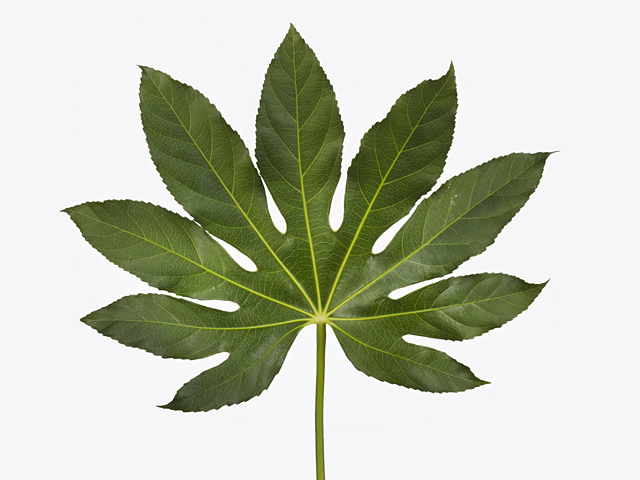Fatsia japonica (leaf)

| Winter hardness | Limited (USDA-zone 8) |
| Leaf surface | Glossy |
| Light conditions | Sunny; Semi-shades |
| Toxicity (if consumed) | Fairly |
| Moisture requirements | Moist |
Fatsia japonica, commonly known as the castor oil plant, is a stunning foliage plant that adds a touch of tropical beauty to gardens. Native to Japan, this plant can withstand mild winter conditions but is not suitable for areas with harsh freezing temperatures, making it a suitable choice for USDA zone 8 and above.
One of the key features of Fatsia japonica is its glossy leaf surface, which adds a lustrous shine to any garden. The large, deeply lobed leaves create a bold and dramatic effect, making it a popular choice for landscaping. The glossy leaves also reflect sunlight, adding a touch of brightness to shaded areas.
When it comes to light conditions, Fatsia japonica thrives in areas that receive ample sunshine or semi-shaded locations. It can tolerate partial shade, making it a versatile plant for various garden settings. Whether in sun-drenched spots or under the canopy of trees, Fatsia japonica adds a vibrant burst of green to any space.
However, it is important to note that Fatsia japonica possesses a toxic quality if consumed. The plant contains harmful compounds that can cause discomfort or harm when ingested, making it unsuitable for households with pets or small children who may be curious to experiment with taste. It is essential to handle this plant with caution and ensure it is placed in areas that are out of reach.
In terms of moisture requirements, Fatsia japonica prefers consistently moist soil. While it can tolerate periods of drought, it flourishes in environments with regular watering. Adequate moisture helps maintain the plant's glossy appearance and keeps its vibrant foliage healthy and thriving.
Fatsia japonica is an excellent choice for gardens that aim to create a tropical ambiance. Its glossy leaves, ability to adapt to different light conditions, and distinct form make it an attractive addition to any landscape. However, its toxicity should be taken into account when considering placement.
With its limited winter hardiness, Fatsia japonica may require some extra care in colder climates. Gardeners in regions with freezing temperatures should consider protecting the plant during winter months, such as covering it with a frost cloth or moving it to a sheltered location.
In conclusion, Fatsia japonica, also known as the castor oil plant, offers an exquisite and unique addition to gardens. Its glossy leaves, ability to thrive in varying light conditions, and moisture requirements make it a versatile plant for various garden settings. However, caution should be exercised due to its toxicity. With proper care and consideration, Fatsia japonica can be a beautiful and captivating plant to enjoy year-round.
Market availability index by month:
| Jan. | Feb. | Mar. | Apr. | May | Jun. | Jul. | Aug. | Sep. | Oct. | Nov. | Dec. |
|---|---|---|---|---|---|---|---|---|---|---|---|
| 3 | 4 | 3 | 3 | 3 | 3 | 3 | 3 | 3 | 3 | 3 | 3 |